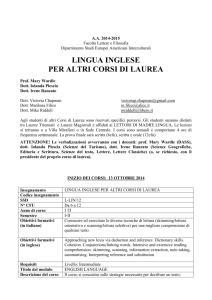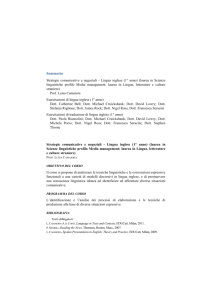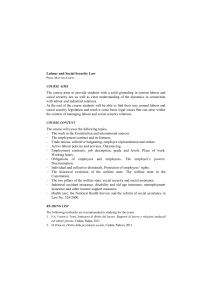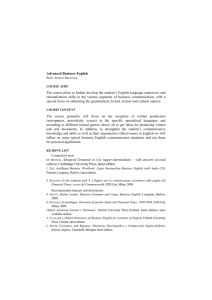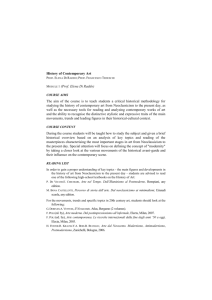Lingua inglese III
advertisement
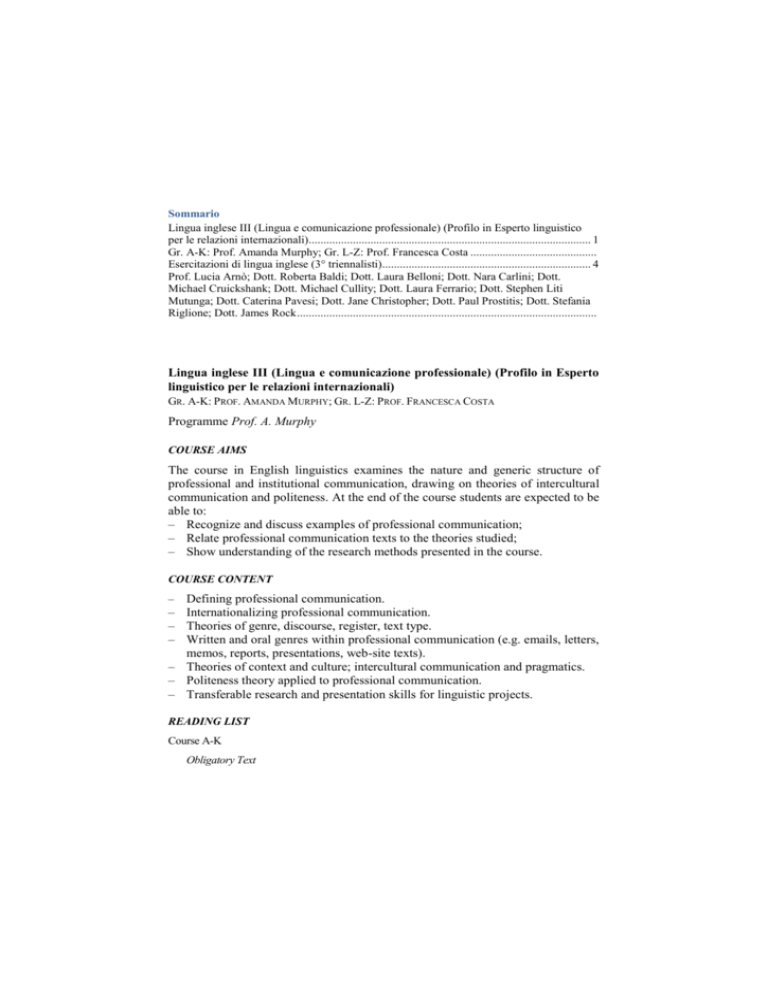
Sommario Lingua inglese III (Lingua e comunicazione professionale) (Profilo in Esperto linguistico per le relazioni internazionali)................................................................................................ 1 Gr. A-K: Prof. Amanda Murphy; Gr. L-Z: Prof. Francesca Costa ........................................... Esercitazioni di lingua inglese (3° triennalisti)....................................................................... 4 Prof. Lucia Arnò; Dott. Roberta Baldi; Dott. Laura Belloni; Dott. Nara Carlini; Dott. Michael Cruickshank; Dott. Michael Cullity; Dott. Laura Ferrario; Dott. Stephen Liti Mutunga; Dott. Caterina Pavesi; Dott. Jane Christopher; Dott. Paul Prostitis; Dott. Stefania Riglione; Dott. James Rock ...................................................................................................... Lingua inglese III (Lingua e comunicazione professionale) (Profilo in Esperto linguistico per le relazioni internazionali) GR. A-K: PROF. AMANDA MURPHY; GR. L-Z: PROF. FRANCESCA COSTA Programme Prof. A. Murphy COURSE AIMS The course in English linguistics examines the nature and generic structure of professional and institutional communication, drawing on theories of intercultural communication and politeness. At the end of the course students are expected to be able to: – Recognize and discuss examples of professional communication; – Relate professional communication texts to the theories studied; – Show understanding of the research methods presented in the course. COURSE CONTENT – Defining professional communication. – Internationalizing professional communication. – Theories of genre, discourse, register, text type. – Written and oral genres within professional communication (e.g. emails, letters, memos, reports, presentations, web-site texts). – Theories of context and culture; intercultural communication and pragmatics. – Politeness theory applied to professional communication. – Transferable research and presentation skills for linguistic projects. READING LIST Course A-K Obligatory Text A.C. MURPHY (ED.), Professional Communication: from genre to intercultural context, Educatt, Milan, 2015. Further bibliography may be communicated via Blackboard during the course. Background Reading and Reference books, particularly for students aiming to do their dissertation in English linguistics. F. BARGIELA-CHIAPPINI-DANIEL Z. KADAR, Politeness Across Cultures, Palgrave Macmillan, Basingstoke, 2011. D. BIBER-S. JOHANSSON-G. LEECH-S. CONRAD-E. FINEGAN, Longman Grammar of Spoken and Written English, Longman, Harlow, 1999. Z. DORNYEI, Research methods in applied linguistics, OUP, Oxford, 2007. A. HOLLIDAY-M. HYDE-J. KULLMAN, Intercultural Communication: An advanced resource book. Routledge, London, 2010. A. KOESTER, Investigating Workplace Discourse, Routledge, London, 2006. J. MCCORMACK, Brief. Make a bigger impact by saying less, Wiley, Hoboken, 2014 (e book). L. RUIZ DE ZAROBE-Y. RUIZ DE ZAROBE, (eds.), Speech Acts and Politeness across Languages and Cultures, Peter Lang, Bern, 2012 (ebook). J. SINCLAIR, Trust the text: language, corpus and discourse, Routledge, London, 2004. A. WIERZBICKA, English: Meaning and Culture. Oxford University Press, Oxford, 2006. A. WRAY-A. BLOOMER, Projects in Linguistics: A practical guide to researching language, Hodder Education, London, 2006. TEACHING METHOD Lectures, group work, group and/or individual student presentations. ASSESSMENT METHOD Project work on a linguistic topic linked to the course, and a final oral exam in English. The topic of the linguistic project (written in English) is proposed by the student and agreed on by the course lecturer before it is carried out. It takes the form of a presentation of 10 slides, which made be handed in (printed) or presented orally during the semester. The marking criteria for projects are: – clarity of exposition of topic (10 marks), – accuracy of language and presentation (10 marks), – depth of research and use of appropriate methodology (10 marks). The final oral exam may be taken once students have passed the written and oral language exams (prove intermedie) and handed in their project. The oral part of the exam is marked on a discussion of the project, knowledge of the course themes and the ability to discuss them critically in fluent, appropriate English. NOTES The course is taught in English and students must enrol via the Blackboard platform. The final mark for English Language III (Language and Professional Communication) (13 CFU) represents both the language exams (i.e. the written and oral prove intermedie) and the English linguistics exam for this course (Professional Communication). With the exception of incoming Erasmus students from other universities, students must pass the language exams before they take the linguistics exam. For Erasmus students, the Professional Communication course (30 hours) is worth 5 CFU. Programme Prof. Francesca Costa COURSE AIMS The course will enable students to develop skills for the analysis of spoken and written texts in English, with special emphasis on language and communication in the field of international relations. The course will promote awareness of the relationship between language and culture. COURSE CONTENT – – – – – The influence of culture on language. Discourse Analysis and Conversation analysis. Linguistic features of written political documents. Linguistic features of political speeches. Linguistic and rhetorical means of persuasion. READING LIST Course L-Z A. PARTINGTON-C. TAYLOR, Persuasion in Politics, LED, Milano, 2010, 2nd ed. C. CUCCHI, Language, Culture and Politics, EDUCatt, Milano, 2011. F. COSTA-A. MURPHY (eds.), Readings for Language and Professional Communication: International Relations, Selected Readings, EDUCatt, Milano, 2011. Suggested extra readings P. CHILTON, Analysing Political Discourse, Routledge, London, 2004. TEACHING METHOD Lectures, Group presentations, Practical Sessions. ASSESSMENT METHOD – – Continuous assessment with a final oral exam. The mark will be calculated as follows: ability to: report on and comment on the topics dealt with in the course; explain and comment on the linguistic features of political discourse; communicative competence. NOTES The course is taught in English and students must enrol via the Blackboard platform. The final mark for English Language III (Language and Professional Communication) (13 CFU) represents both the language exams (i.e. the written and oral prove intermedie) and the English linguistics exam for this course (Professional Communication). With the exception of incoming Erasmus students from other universities, students must pass the language exams before they take the linguistics exam. For Erasmus students, the Professional Communication course (30 hours) is worth 5 CFU. Esercitazioni di lingua inglese (3° triennalisti) PROF. LUCIA ARNÒ; DOTT. ROBERTA BALDI; DOTT. LAURA BELLONI; DOTT. NARA CARLINI; DOTT. MICHAEL CRUICKSHANK; DOTT. MICHAEL CULLITY; DOTT. LAURA FERRARIO; DOTT. STEPHEN LITI MUTUNGA; DOTT. CATERINA PAVESI; DOTT. JANE CHRISTOPHER; DOTT. PAUL PROSTITIS; DOTT. STEFANIA RIGLIONE; DOTT. JAMES ROCK COURSE AIM The general aim of the course is to provide students with detailed knowledge of the characteristics of the texts and vocabulary appropriate to their curriculum, and to develop their oral and written language competence in areas useful to their professional development. Particular attention is directed towards vocabulary and idiomatic usage. COURSE CONTENT Students work on a range of up-to-date materials prepared by their teachers specifically for their curricula, including passages for reading comprehension from newspapers and online sources, presented in various formats, including written texts, advertisements, audio files. The course also offers an important translation component, both into English and into Italian, in which authentic texts which are relevant to their field of study are translated in class and at home. READING LIST Students should possess both a monolingual and a bilingual dictionary. Recommended bilingual dictionaries: Il Sansoni Italiano-Inglese, Sansoni, 2010, 5th ed. Grande Dizionario Hoepli Inglese con CD-ROM, Hoepli, 2007. Il Dizionario Inglese Italiano Ragazzini, Zanichelli, 2012. Oxford Paravia. Il dizionario inglese-italiano, italiano-inglese. 2006. 2nd ed. Recommended Monolingual dictionaries: Advanced Dictionary, Collins Cobuild, 2008, 6th ed. Advanced Learners Dictionary, Cambridge, 2010, 3rd ed. Advanced Learners Dictionary, Oxford, 2010, 8th ed. English Dictionary for Advanced Learners, Macmillan, 2007, 2nd ed. Longman Dictionary of Contemporary English, 2010, 4th ed. Other useful reading: C. TAYLOR, Language to Language, Cambridge University Press, Cambridge, 1998. TEACHING METHOD Lessons in the classroom, self-study using selected materials on the Blackboard platform and in the multimedia labs. ASSESSMENT METHOD The language exams are called prove intermedie (intermediate tests) to indicate that they are a step towards the end of year exam in either English Linguistics or English Literature, according to the student’s curriculum. The grades in the written and oral language exams contribute to the final single mark awarded for the whole first year programme. The third year written language exam is in two parts. Part 1 consists of two translations, one from English to Italian, the other from Italian to English. In Part 1, both monolingual and bilingual dictionaries may be used, but not special dictionaries (such as exam dictionaries or collocations dictionaries). Part 2 consists of a reading comprehension, a writing exercise, such as drawing up a letter of various types (such as a job application letter or a complaint letter), and the last part of the exam consists of a listening comprehension with a gap-fill test. Dictionaries may not be used in Part 2. At the oral exam, students must be able to discuss readings selected during the year. Listening and speaking skills are assessed in a face-to-face conversation, together with pronunciation, communicative fluency, grammatical accuracy, use of appropriate vocabulary and the ability to interact. Students must demonstrate that they know the contents of the readings and are able to discuss related themes. AVVERTENZE It is important that students remain in the course assigned to them so as to ensure evenly-sized lanaguage courses. Any students who do not succeed in passing their written exams are required to attend the remedial courses (corso di recupero) in the following semester. Place and time of consultation hours The language teachers are available to talk to students after lessons.
